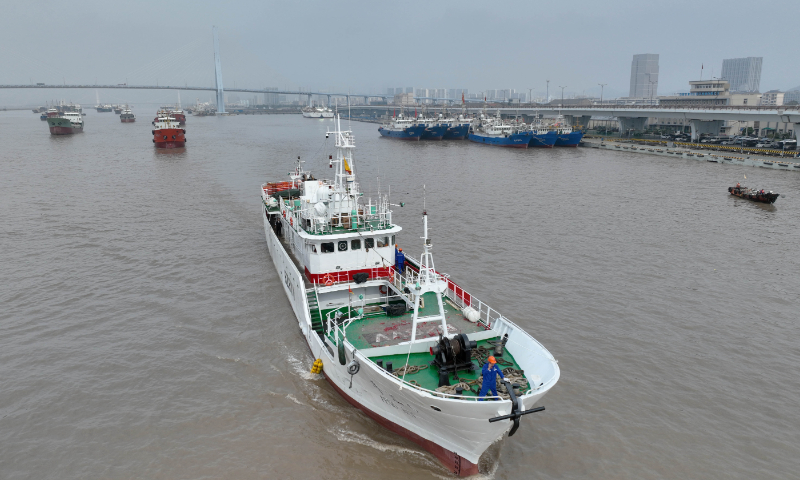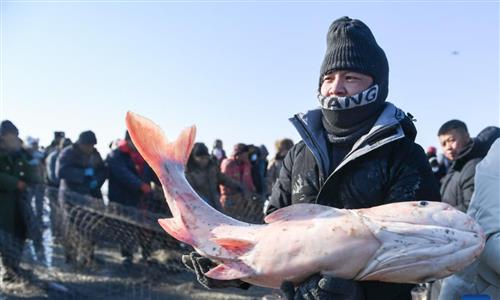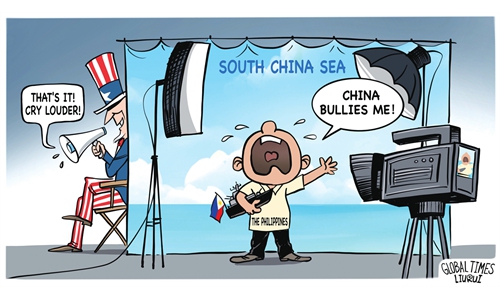West’s ill intention revealed in their lies about ‘forced labor’ in China’s fishing industry

A tuna fishing boat, Fenghui 5, departs from a wharf in Zhoushan, East China's Zhejiang Province, on March 25, 2024. The boat is heading to Kiribati in the South Pacific, where it will fish for tuna. The voyage is about 6,000 nautical miles, and it will take about 30 days to reach the designated fishing grounds. Photo: VCG
On March 11, the 28th Hong Kong International Film and TV Market (FILMART) opened at the Hong Kong Convention and Exhibition Centre. During the event, a promotion and release event for the film "Chasing Tuna in the Ocean" was held at the Shandong Pavilion.This Chinese documentary film, made by Shandong Fire Dragon Culture Communication Co., Ltd. and directed by director Jing Jianmin from Weihai City, Shandong Province, was released on October 8, 2023, in the Chinese mainland.
The production team of this documentary followed four ocean-going fishing vessels from Shandong to the fishing area in the Indian Ocean, accumulating 3,000 to 4,000 hours of filming.
Pelagic fishing is globally recognized as one of the most challenging and high-risk industries, characterized by harsh environments and conditions. Crews spend long periods at sea, sometimes not returning to land for months, and many even spend years away from home. In addition, they are constantly exposed to threats such as tsunamis, typhoons and even piracy.
The images in the documentary are slightly rough and plain, without the delicate, emotionally impactful art of editing or sensationalism, but they highlight the immense power of truth.
Despite the contradictions between aspirations and reality, these deep-sea fishing practitioners have chosen to work hard and maintain a positive and optimistic mindset, while shouldering the burden of their families. As one crew member put it, "Any achievement earned with one's own hands deserves everyone's respect."
However, it is outrageous that certain agencies and organizations with ulterior motives aimed at advancing the agenda of strategic containment of China have distorted this as a scourge of forced labor.
These claims come from Ian Urbina, director of The Outlaw Ocean Project, and his team. Starting from October 2023, the Outlaw Ocean Project, a US-based non-profit news organization, has released a series of reports and images denigrating China's fishing industry. The project's website is also constantly updated. These out-of-context narratives depart from the reality of China's fishing industry development, with no firsthand investigation at all, and denigrate the spirit of hard work and the spiritual core of the Chinese fishermen's pursuit of a better life.
The project presents a number of unsubstantiated smears, a mere collage of speculation, without any real evidence that these activities are illegal or that forced labor exists.
The claim of "forced labor" has increasingly become a tool of the US Congress in its fight against the Chinese economy. These fallacies, fabricated by certain anti-China organizations, have no evidence whatsoever and are purely farcical, created in the illegal manner of "conviction first, review later."
On December 12, 2023, the House Select Committee on the Strategic Competition between the United States and the Chinese Communist Party recommended in a report that stricter controls be imposed on seafood imports from China that may involve forced labor.
On March 13, 2024, a US congressional committee called on the Biden administration to take action against alleged forced labor against the Chinese fishing industry.
In fact, China's fisheries have made significant contributions to meeting the demand for aquatic products in China and the world, as well as important contributions to the scientific conservation and sustainable use of global fishery resources.
The world's pelagic fisheries have a long history. At different times in history, different countries or regions have participated in offshore fishing. Since the establishment of its offshore fishing fleet in 1985, China has actively engaged in mutually beneficial and pragmatic fisheries cooperation with the countries concerned. In addition, China has implemented strict management measures to monitor and control the position of fishing vessels. China has also taken the lead in voluntarily implementing fishing moratoriums on certain key high-sea fishing regions.
After more than 30 years of hard work, China's fishing industry has made remarkable development achievements. China has signed reciprocal cooperation agreements with relevant countries and regions in Asia, Africa, South America and Oceania, and has carried out practical fisheries cooperation in an orderly manner in accordance with the arrangements and the laws and regulations of the cooperating countries.
However, some developed countries are endeavoring to obstruct the development of China's offshore fishing industry. They have even manipulated certain international non-governmental organizations and media outlets to magnify individual acts and incidents of illegal fishing and to discredit China's lawful and compliant foreign fisheries cooperation. The accusations are full of Western contempt for the Chinese people's right to development, revealing the West's deep-rooted prejudice against China's development.
The Chinese people have the right to pursue happiness through hard work, which includes the right to the peaceful exploitation of the resources of the high seas in accordance with international norms. This is also a manifestation of China's peaceful development toward the world.
The author is a postgraduate student at the Shandong University. opinion@globaltimes.com.cn


